- Home
- Terry C. Johnston
Shadow Riders, The Southern Plains Uprising, 1873 Page 3
Shadow Riders, The Southern Plains Uprising, 1873 Read online
Page 3
They nodded.
“It is good. Go now—see what the white men have for us in their wagons!”
With a whoop, both young war leaders leapt away, quickly dividing the hundred warriors. Big Tree sent a wild cry aloft as he led his band to sweep around the left side of the wagon circle. Yellow Chief led his warriors to the right.
All the white men had abandoned their tiny mealtime fires and now lay on their bellies in the shade beneath their wagons, their long guns ready.
For those first minutes, Satanta watched the young warriors hurl themselves down on the wagons, circling the white men, whirling past one another in two blurred rings of noise and terror as they pushed their ponies to great speed in that arc of spraying sand and brilliant summer sunshine. Closer and closer to the wagons they rode with each circuit, firing their arrows from short, Osage-orange bows, then quickly dropping to the off-side so that the white man had no more target than a heel hooked over a pony’s backbone or a brown hand tangled in the pony’s mane.
For a long time the white man did not fire, seemingly content to watch the brown-skinned riders and their lunging, sweating ponies, content to listen to the arrows hiss overhead and clatter into the branches of the trees where they had circled up for the noon meal. More arrows tore through wagon canvas. Iron-tipped wasps stung the mules kept at the center of the ring, making the animals noisy in their braying, thrashing, crazy dance of confusion and fear while the white man waited safely beneath his wagons.
Satanta put the bugle to his lips and blew three loud notes.
It was enough of a call on that dry, hot wind to bring about a pause in the raucous attack. Yellow Chief, then Big Tree, clattered to a halt at the chief’s side.
“Arrgghh!” cried Yellow Chief in frustration. “They will not shoot at us, White Bear!”
“The white man will not fire unless he is afraid,” Satanta explained. “You haven’t made him afraid yet. When I was a young man, I rode right into the jaws of my enemy’s might. I stared at his arrow point, the sharp end of his lance, the gaping mouth of my enemy’s rifle. If you want your young warriors to respect you—show them your courage … now. Only then will we be able to end this racing in circles and get down to lifting the white man’s scalps!”
“Aiyeee!” shouted Big Tree as he reined away in a tight circle.
“We will not fail you!” roared Yellow Chief as he hammered heels into his pony’s ribs.
Big Tree had the lead now, his warriors following him in ever nearer to the wagons. No longer content to shoot from a safe distance, the young Kiowas raced closer and closer to the white men on their bellies in the shadows. Then Yellow Chief saw that he must do even better as he thundered in with his half-a-hundred. He would ride into the jaws of those guns and make the white man’s bowels run cold with fear.
“Close enough that you see the fear in their eyes, Yellow Chief,” said Satanta softly as he witnessed the wild, noisy race.
Then suddenly the ring of wagons erupted with explosions. The white men were shooting their guns at last.
He nodded. “It is good! Now you ride close enough to make the white man’s heart turn to water.”
Thirty guns roared, booming low there beside the Llano in that circle beneath the trees where the gray-white gun smoke clung just above the dirty canvas of the wagons. While some of the white men frantically reloaded their rifles, others continued to aim and shoot their pistols at the charging horsemen.
In a spray of sand and grit and tufts of summer grass, a warrior spilled from his pony. Tumbling through the dried, yellow stalks—his shoulder and chest already slicked with crimson.
Then another pony faltered, stumbled and spilled its rider. That animal … and another … then a third never rose from the grassy sand. In agony the riders crawled on their bellies away from the stinging smoke and spitting fire of the white man’s guns.
Satanta could hear Yellow Chief exhorting his warriors now, goading them into wilder bravery. The attack was taking longer than he had expected—and still the white man remained safe inside his ring of wagons. Satanta had not seen one of the enemy fall, dead or wounded. He blew his bugle once more.
When the two war leaders halted before him, Satanta said, “We must get inside that ring of wagons. The white man is like a field mouse burrowed under the shadows. The only way is the way of the badger—go in and get him out!”
With resolve, the two looked at one another. Then without a word, they reined away to their warriors.
Now the end would come, Satanta felt certain. All they needed to do was ride close enough, shoot many arrows then leap among the wagons. It would be over soon enough—this smashing the war clubs into the faces and driving the tomahawks into the backs of the heads until no white man remained alive.
It must be done fast, as he had learned many, many winters before. A long battle only meant many Kiowa dead and wounded. In his youth Satanta had learned the fight must be quick and furious to be a victory.
The white man’s rifles erupted with a deafening roar once again.
As he watched, Satanta saw Yellow Chief sweep in from behind the ring, daring closer than any of the rest, his small rawhide shield held up to cover him as he waved the stone-headed club at the end of his arm.
Then the warrior was spinning backward off the pony. And the animal was rearing back as well, flinging its rider into the grassy sand like a child’s doll. The pony landed atop Yellow Chief’s legs.
Satanta’s lungs did not breathe, watching the young war chief’s hands claw desperately at the crusty earth, raking at the grass, trying to yank himself free as frothy blood gurgled from his lips.
His insides are torn!
As Satanta yanked the bugle to his lips, he saw Yellow Chief stop moving, his two hands slowly opening, freeing the unyielding earth and grass beneath him.
Before the Kiowa chief’s bugle call was finished, two more warriors had spilled from their ponies. As that pair of horsemen crawled away from the deadly wagon ring, their ponies thrashed and kicked in death throes … then lay still, raising only their heads as they cried out in a pitiful, humanlike scream of torment.
When the two young ones believed they were safe enough, both clambered to their feet and dashed toward the trees.
Bullets found them both in a renewed frenzy of firing from the wagons.
Satanta felt each body go down in a bloody splatter, as if it were his own.
“Big Tree!” he shouted. “The toll is too great.”
“You are calling off the attack?”
He nodded. “We will find some other white men, another wagon train to attack. We leave now, but not until you have first sent your men to get those who have fallen!”
Big Tree looked over his shoulder at the open ground sloping down to the Llano Crossing where the white men huddled in the midday shadows with their big, long guns. “We can get four. Yet … Yellow Chief—he is too close to the wagons.”
Satanta tore his eyes from the white men and the greasy white smoke that hung in a hot, bitter-smelling cloud over the wagon ring. Now he glared at the young war chief.
“I am an old man. I have fought many battles in my many summers of raiding. Yet you are sitting here, telling me none of these young men will ride in to rescue the body of Yellow Chief?”
Big Tree wiped his lips. “He is … surely he is dead, White Bear.”
“Here!” Satanta snapped, pulling the rawhide loop from his shoulder, removing the bugle and flinging it at Big Tree. “I will show you the true courage of a Kiowa warrior! Watch—all of you! And behold your chief!”
With a cool, arrogant courage, Satanta slowly led his prancing war pony within rifle range of the thirty white men, then suddenly hammered his heels into the animal’s ribs and in a burst of furious speed tore straight for the body of Yellow Chief. As he neared the fallen pony, Satanta gripped the reins in one hand, his heel locked on the pony’s hip, inch by inch leaning to the side, his fingers raking the brittle, bloodstained
grass.
For some reason, the white men did not fire their weapons at that lone horseman. Perhaps they were awed with his courage, presenting his full, brown body to their long guns. Then only one man fired, and that shot went wild. In the next instant he was over the bloodied body, reining his heaving pony to a stuttering halt.
Satanta grasped on the warrior’s arm with the strength of two men and with a mighty shout pulled the broken, crimson-smeared body from beneath the dead pony. As the white men began urging one another to shoot, the Kiowa chief slung Yellow Chief across the back of his pony, gave the wagon ring a sneer and a profane wave of his arm, then reined for the timber at a lope, presenting his wide, brown back to his enemy.
“We go now, warriors!” Satanta said as he let two others take the body of Yellow Chief from him. Clearly, most of the hundred still burned with battle fever.
“Do not worry, my brothers,” the Kiowa chief told them as they abandoned the white man’s wagons and the Llano Crossing. “Someone … and soon … will pay in blood for the life of Yellow Chief!”
Chapter 1
Moon of Ducks Coming Back 1871
Satank gazed into the sky overhead, so incredibly blue now that the spring storm had passed and the thunderstorms had rolled on to the east where the civilized Indians lived on their reservations, pretending to be white men.
The ducks were coming back. They and the geese filled the sky these lengthening days, flying north in great, dark vees against the pale, azure blue of the sky reflected in the small ponds and puddles of water left after each passing spring thunderstorm.
The old man liked this time of the year best. It made him feel like a randy young colt again.
Bald Head, the white Indian agent over at Fort Sill, called this time April.
Satank liked his way better. It was this time of the year he remembered the tingle of juices flowing in his veins and the strength of mating surge through his loins. Ah, the ways of a young man!
And for the first time in his life, Satank actually grew jealous of his own grown son, married now, with two sons of his own.
Among his people, the Kiowa, Satank’s name meant “Sitting Bear.”
And sitting was something he most enjoyed these days. He drank deep of the clean air left behind in the storm’s wake as the dark clouds cleared off and rumbled eastward. It was near here that he had been born nearly seventy winters before. This was the land they had fought the Comanche for, the land they held along with the Comanche across many summers of hunting buffalo. And riding side by side, the two tribes had struggled against the hated white Tehannas.
Even the merest thought of the white man spoiled Satank’s mood. That thought come here now to cloud up the sky of his mind and moods like the dark thunderclap clouds so full of noise and wind and fury.
The Mexicans far to the south and west had rarely ventured this far into Comanche and Kiowa land. And if they had, it was only to trade along the well-established routes carved out long winters beyond remembering across the high Staked Plain. Yes, the Mexicans came to trade in cattle and horses stolen from the white man. And there were occasionally the Comancheros who dared ride into the land of the Comanche and the Kiowa to trade as well—to trade in human captives.
A life his grandsons would not have for their own, this chasing after the buffalo for all the Kiowa needed to survive in this great land where they had come from the far north. Yet it was here, among the Republican and Arkansas herds of the shaggy, black beasts, that the Kiowas and Comanches did not yet realize they were playing out the final acts of a great tragedy like no other in the history of the world.
The first act in that long played-out drama had seen the coming of the strange, pale men out of the south armed with powerful weapons, some marching on foot, others riding atop the big elk-dogs. It was the coming of the horse that ushered in the second act of the tragedy. For now the Kiowa and others had their first guns. More important—now at last they rode as true kings of all they cast their eyes upon.
It was the horse that evolved the Kiowa into a truly nomadic people, free and wild—yet a people in every way totally dependent upon the buffalo season after season after season, dependent for food, and shelter and clothing, and for the very purpose to their lives. The Kiowa was as irretrievably bound to the buffalo as much as any prisoner was shackled by irons to his cell. No matter that for Satank’s people the cell had no roof save that of endless powder blue overhead, no walls save that of the far horizons at the curve of the earth in all four directions.
They were locked in this prison, unaware that the death of the buffalo would soon spell the death of their culture. Yet, for the last five winters, Satank’s spirit helper had been telling the old man to listen fervently to the wind. But the old man had laughed at that—simply because the wind always blew out here on the plains!
Still … when he did listen, Satank heard the faintest whisperings of the spirits long gone the way of breath-smoke, telling him the final days had come and were now upon his people. With the going of the buffalo, they told him, so would go the Kiowa. The bones of his people left to bleach in the sun on the high prairie like the carcasses left to rot by the few white hunters who were bravely daring to cross the Arkansas into the last sacred hunting ground guaranteed the Kiowa and Comanche by the treaty-talkers.
Long, long ago, nothing had been so complicated as this. He was a young warrior then, like his son now. Satank had taken his first wife and they had been joined by two small children come to bless their lodge. Days filled with nothing more worrisome than raiding and hunting the buffalo with his bow. Each summer, he purged himself at the sun dance the medicine men held along one creek or another in this vast, rolling grass kingdom ruled by the brown-skinned sovereigns of the southern plains. It had been so good … but only for half his life, Satank remembered.
Even when his enemy was as bloodthirsty as was the old Kiowa chief, it was good, simply because a warrior clearly understood his enemy—the Mexican.
The dark-skinned men marching out of the south and west of the great Staked Plain would often talk soft and sweet while stroking their dark beards or smoothing their dark mustaches when they coveted something dear to the Kiowa. Satank himself had immediately liked the long, scraggly mustaches of the Mexicans—so grew one himself—an oddity among a warrior society that normally plucked every single facial hair, including eyebrows. He wore his mustache as proudly as any symbol of manhood.
While the Mexicans often talked sweet when they wanted something, on the next occasion of meeting with the Kiowa, the Mexican could be as brutal as any warrior: butchering the Indian men, women and children without qualm or remorse. What bothered most Kiowa about the Mexicans was that the dark-skins would lure the Indians into their villages and settlements with promises of barter and trade-goods, and once the gates were shut, those Mexicans would slaughter the ignorant bands as retribution for past raids upon herds of cattle and horses or for carrying off a few women and children to become new members of the tribes.
The Kiowa learned quickly to hate the Mexican, and hate him with everything he had. But unlike the white American who had for so long had little to do in this great kingdom of grass and hills, the Kiowa did understand the Mexican. They were alike in many ways.
Then the white man began to arrive in such numbers, no longer just content to push down from the land of the Lakota and Osage and Pawnee, crossing the Arkansas, the Cimarron and the Canadian on his way only to trade with the Mexicans in Santa Fe. Now the white man came out of the east, his walking soldiers in blue uniforms and his rolling wagon guns rumbling along behind, marching to fight the Mexicans, to take land away from them.
Just like the white man had later begun taking this grand, grass kingdom of rolling hills from the Comanche and the Kiowa who had ruled it from atop their fleet ponies.
In those years following the white man’s war with Mexico, the number of Tehannas multiplied like puffballs on the prairie after a spring thunderstorm. Not that the
y were there to kill the buffalo, no—instead these built their lodges beside the creeks and scratched at the earth and raised their animals and kept to themselves while the Kiowa most loved to be in the company of one another. This was something hard for Satank to comprehend—that the Tehannas would want to set themselves off from others of their own kind.
Twenty winters after the white man’s war on the Mexicans, in the summer after Yellow Chief was killed, word came to the Kiowa that the treaty-talkers wanted again to speak to the warrior bands. Two years before, they had met with the white man and received his presents and signed his talking paper at the mouth of the Little Arkansas. Now again, there was to be more talk far to the north, on Medicine Lodge Creek.
That was four winters ago by Satank’s count—when the bands gathered for the great peace council not far from Fort Larned in the white man’s Kansas Territory. Many miles to the south on the Cimarron River, and refusing to yet come in to talk, were camped the might of the Southern Cheyenne, more than 250 lodges in all. Skeptical, they waited far from the reach of the white man’s soldiers should this treaty-talk prove to be a ruse and a trap.
On the other hand, Black Kettle’s twenty-five lodges of Southern Cheyenne marched right to the banks of Medicine Lodge Creek itself to camp. Below them stood more than a hundred lodges of Comanches. And downstream from them were raised the camp circles of some 150 lodges of Kiowa, along with eighty-five lodges of Kiowa-Apache—warrior bands under Satank, Satanta, Big Tree, Big Bow, Lone Wolf and Kicking Bird. Camped closest to Fort Larned were some 170 lodges of Southern Arapaho.
All told, an impressive gathering of more than eight hundred lodges, each camp in a joyful mood, for the hunting had been good in recent days. What was more, word had it the soldiers at the nearby post had just received shipments of the goods soon to be brought out to the great encampment in wagons: coffee, sugar, flour and dried fruits; in addition to blankets and bolts of colorful cloth, there were to be surplus uniforms from the white man’s recent war among himself, uniforms the War Department had in the last few months turned over to the Interior Department. And on its way as well was a sizable herd of the white man’s cattle to feed the gathering bands.

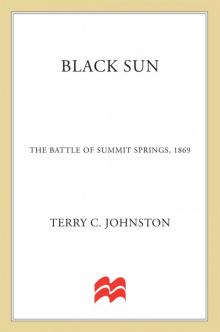 Black Sun, The Battle of Summit Springs, 1869
Black Sun, The Battle of Summit Springs, 1869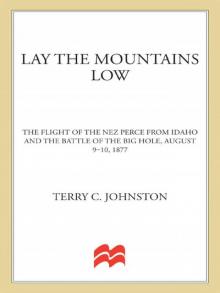 Lay the Mountains Low
Lay the Mountains Low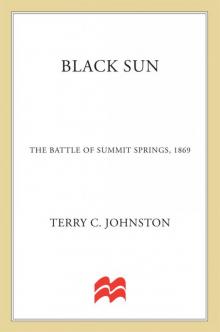 Black Sun: The Battle of Summit Springs, 1869 (The Plainsmen Series)
Black Sun: The Battle of Summit Springs, 1869 (The Plainsmen Series)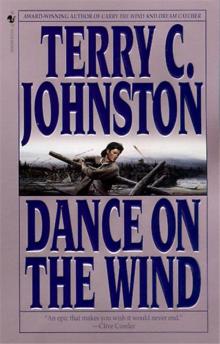 Dance on the Wind tb-1
Dance on the Wind tb-1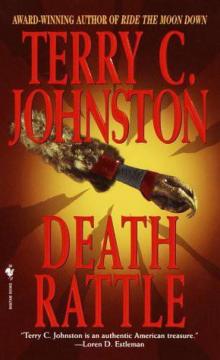 Death Rattle tb-8
Death Rattle tb-8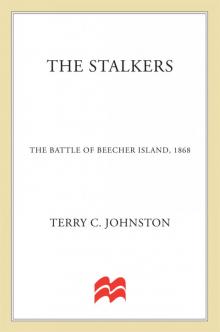 The Stalkers
The Stalkers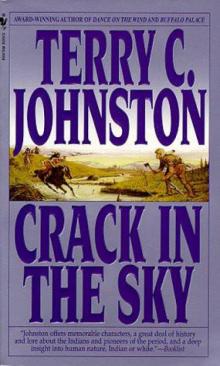 Crack in the Sky tb-3
Crack in the Sky tb-3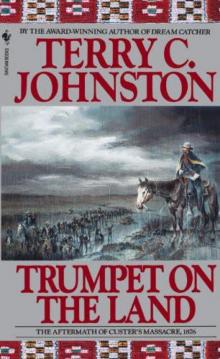 Trumpet on the Land: The Aftermath of Custer's Massacre, 1876 tp-10
Trumpet on the Land: The Aftermath of Custer's Massacre, 1876 tp-10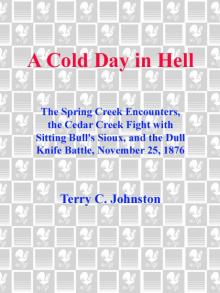 A Cold Day in Hell
A Cold Day in Hell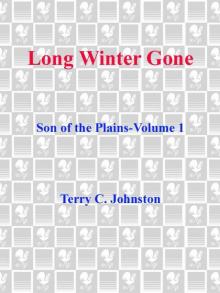 Long Winter Gone: Son of the Plains - Volume 1
Long Winter Gone: Son of the Plains - Volume 1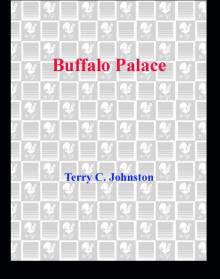 Buffalo Palace
Buffalo Palace Cries from the Earth
Cries from the Earth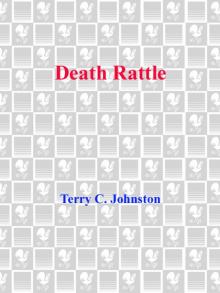 Death Rattle
Death Rattle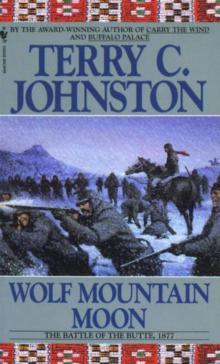 Wolf Mountain Moon: The Battle of the Butte, 1877 tp-12
Wolf Mountain Moon: The Battle of the Butte, 1877 tp-12 Crack in the Sky
Crack in the Sky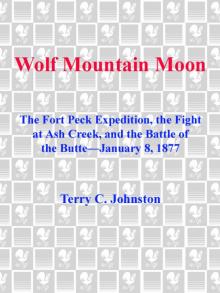 Wolf Mountain Moon
Wolf Mountain Moon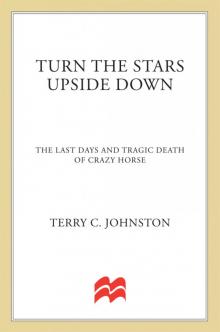 Turn the Stars Upside Down: The Last Days and Tragic Death of Crazy Horse
Turn the Stars Upside Down: The Last Days and Tragic Death of Crazy Horse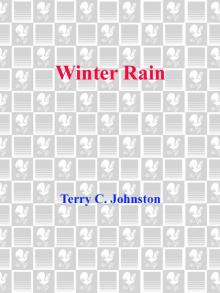 Winter Rain
Winter Rain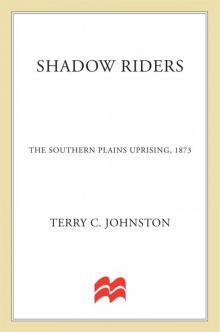 Shadow Riders: The Southern Plains Uprising, 1873 (The Plainsmen Series)
Shadow Riders: The Southern Plains Uprising, 1873 (The Plainsmen Series)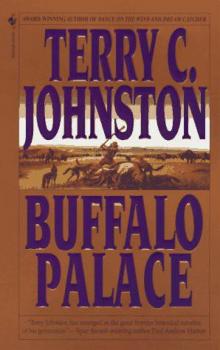 Buffalo Palace tb-2
Buffalo Palace tb-2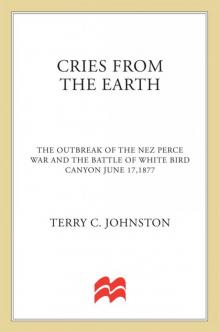 Cries from the Earth: The Outbreak Of the Nez Perce War and the Battle of White Bird Canyon June 17, 1877 (The Plainsmen Series)
Cries from the Earth: The Outbreak Of the Nez Perce War and the Battle of White Bird Canyon June 17, 1877 (The Plainsmen Series)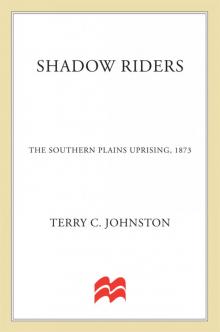 Shadow Riders, The Southern Plains Uprising, 1873
Shadow Riders, The Southern Plains Uprising, 1873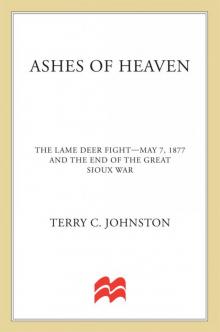 Ashes of Heaven (The Plainsmen Series)
Ashes of Heaven (The Plainsmen Series)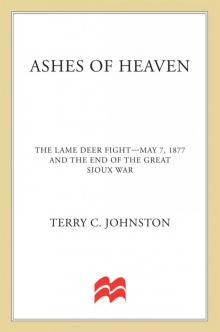 Ashes of Heaven
Ashes of Heaven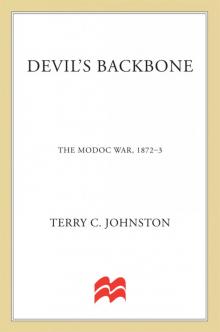 Devil's Backbone: The Modoc War, 1872-3
Devil's Backbone: The Modoc War, 1872-3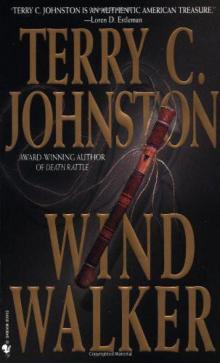 Wind Walker tb-9
Wind Walker tb-9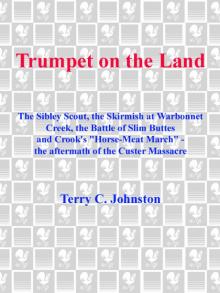 Trumpet on the Land
Trumpet on the Land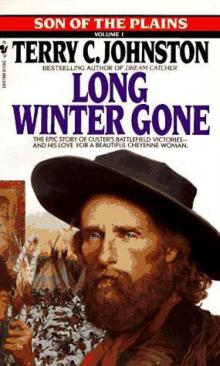 Long Winter Gone sotp-1
Long Winter Gone sotp-1 Dying Thunder
Dying Thunder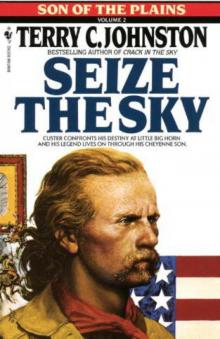 Seize the Sky sotp-2
Seize the Sky sotp-2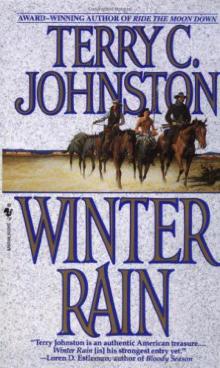 Winter Rain jh-2
Winter Rain jh-2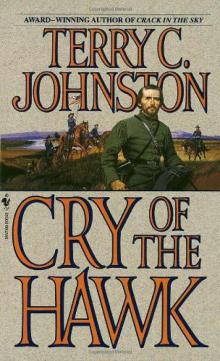 Cry of the Hawk jh-1
Cry of the Hawk jh-1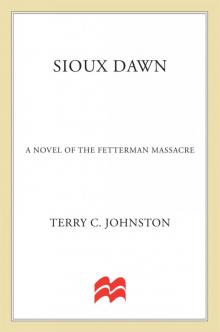 Sioux Dawn, The Fetterman Massacre, 1866
Sioux Dawn, The Fetterman Massacre, 1866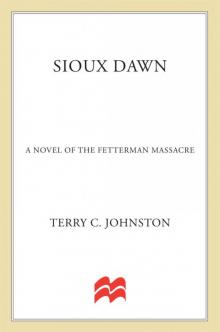 Sioux Dawn: The Fetterman Massacre, 1866 (The Plainsmen Series)
Sioux Dawn: The Fetterman Massacre, 1866 (The Plainsmen Series)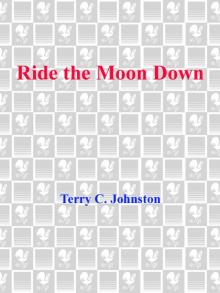 Ride the Moon Down
Ride the Moon Down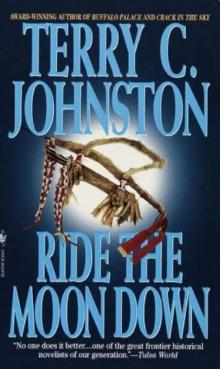 Ride the Moon Down tb-7
Ride the Moon Down tb-7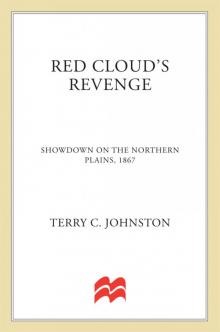 Red Cloud's Revenge
Red Cloud's Revenge Wind Walker
Wind Walker